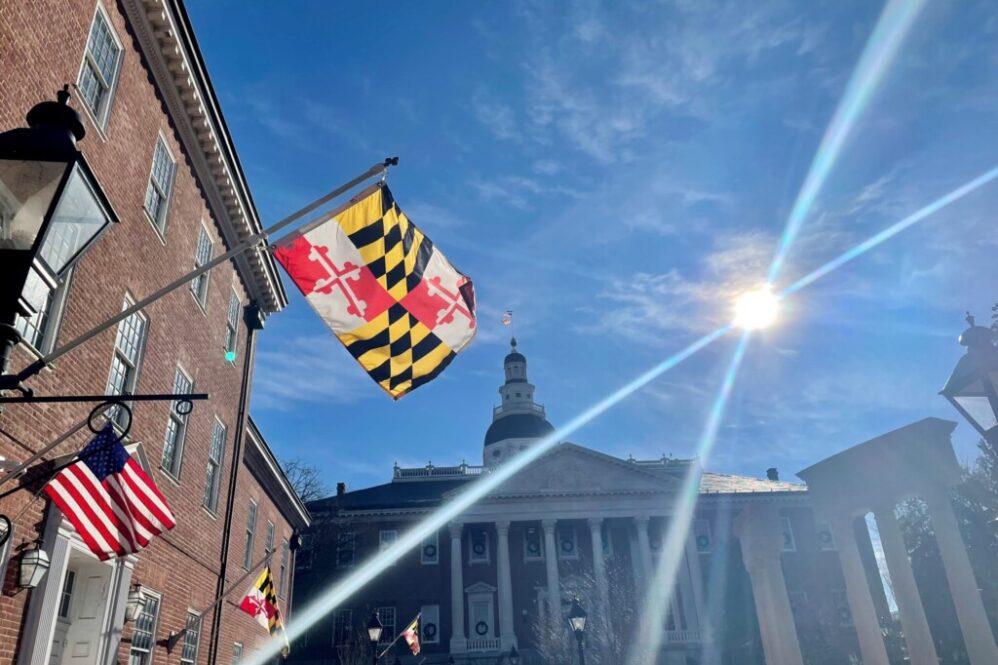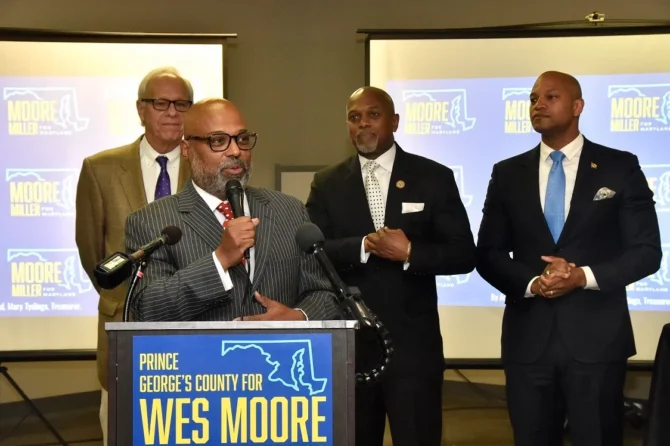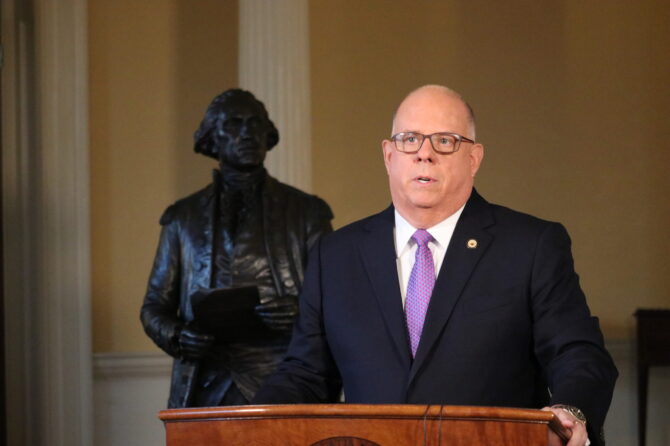DC residents who want to work for the District government will have an opportunity to get in front of hiring managers. With almost 1,000 job vacancies needing to be filled, the DC Department of Human Services will host a hiring event on August 11 and 12. Participating agencies “will make on-the-spot job offers,” according to a news release explaining the event. Registration for the event is required and will be open from July 29 through August 7.
Some of the open positions are in the departments of health and human services, public safety, government operations and infrastructure.
Three seminars are being hosted in preparation for the hiring event and will include tips on resume writing, interviewing, best practices for virtual recruiter engagement and navigating the virtual platform, according to the press release.
It’s all over but the shouting — and some more counting.
Thanks to Gov. Larry Hogan’s veto of a bill that would have enabled election officials to begin opening and counting mail-in ballots early, we still don’t have official winners in some critical primary elections from last week. But we do have enough evidence of how things are going to opine on who some of the winners and losers from the primaries were. So without further ado, here is our exhaustive list:
Winner: Wes Moore
Believe the hype. In all likelihood, he is our next governor, and watch the national publicity roll in. Moore has a lot of smarts and ability, an inspiring life story, a diverse professional history, and a desire to do good. He campaigned as an outsider, yet lined up a powerful array of insider support. But he has zero governing experience, and there will still be some carping about whether his biography has been inflated somehow. It will be interesting to see who will keep him grounded and who he will bring in to help him run state government. Special shout-out, just because we feel like it, to Oprah.
Winner: Donald Trump
If ever there was doubt that the former president thoroughly dominates the Republican Party these days, just regard Del. Dan Cox’s victory in the GOP gubernatorial primary last week on Hogan’s home turf, which makes the win all the more sweet for the revenge-minded ex-president. Never mind that Cox’s triumph almost certainly puts the general election out of reach for Republicans — that’s hardly Trump’s concern.
Loser: Larry Hogan
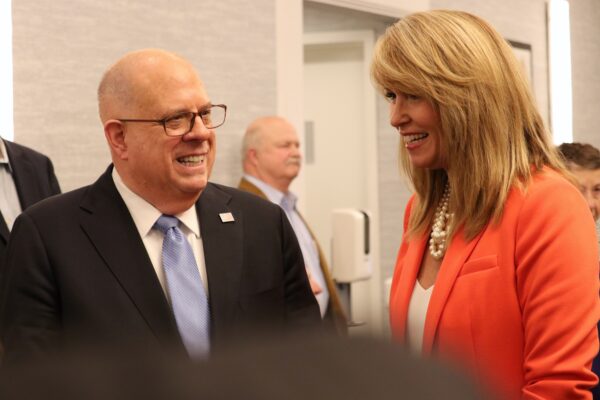
Gov. Lawrence J. Hogan Jr. (R) appeared with his former Commerce Secretary and 2022 gubernatorial candidate Kelly Schulz (R) at a campaign event in Annapolis in March. Photo by Danielle E. Gaines.
At the first few glances, it was a pretty bad primary for the popular Republican governor with the pitch-perfect political antennae, who’s experienced very few political setbacks during his eight-year tenure. His hand-picked candidate, Kelly Schulz, lost badly in the Republican primary for governor, and the GOP nominee for attorney general, Michael Anthony Peroutka, who defeated another Hogan-endorsed candidate, is associated with openly racist groups. How can Hogan keep traveling around the country, preaching his alternative message to Trumpism when he couldn’t even sell it to Republican voters at home?
When it comes to bragging rights with his hated predecessor, former Gov. Martin O’Malley (D), Hogan couldn’t even get his preferred successor through the primary; O’Malley, at least, didn’t see his designated successor, Anthony Brown, lose until the general election (a lost that undoubtedly hurt O’Malley’s presidential ambitions in 2016). Hogan made a few other bad bets, like Matthew Foldi in the 6th District congressional primary. And Hogan also presumed to weigh in on a Democratic primary, endorsing Thiru Vignarajah for Baltimore City state’s attorney. Vignarajah lost.
On the other hand, Hogan saw his daughter, Jaymi Sterling, set herself up to be elected St. Mary’s County state’s attorney in the fall. And there will still be an audience for the type of Republican vision that Hogan’s preaching — especially with the Sabbath Gasbags, as Calvin Trillin so brilliantly labeled the participants in the Sunday chat shows. With the Republicans almost certain to lose the gubernatorial election this year, as Hogan himself has predicted, he at least preserves his status as a unicorn — the only Republican who can win and stay popular in this blue state. So a bad loss, yes. But not a total loss.
Push: Democratic Governors Association
All is fair in politics and war, and the operatives at the DGA got their man in the GOP primary when they helped push Dan Cox over the finish line. The Republican pearl-clutching over the DGA’s strategic tactic of investing heavily in the GOP primary is pretty rich; Cox was probably going to win the primary anyway, and it’s not like Republican outside groups haven’t worked to shape races in Maryland. Still, Democrats are right feel a little queasy over the big investment. Suppose Moore stumbles in the fall and Cox somehow triumphs?
Loser: Peter Franchot
How do you take a sterling, long-cultivated brand as an unconventional and independent politician with contacts and admirers in every corner of the state; how do you take a consistent lead in the polls for a long time, and turn them into a desultory third place finish in the Democratic primary for governor? Franchot was undone by a variety of factors: Party leaders didn’t like him. Some voters remembered how close he stuck to Hogan, giving the Republican governor a patina of bipartisanship he didn’t necessarily deserve. Other voters simply grew tired of Franchot’s attacking and showboating shtick, or felt he had no ideological core. In the end, Franchot and his campaign seemed to lose energy and focus — and at a time when so many Democratic voters are expressing their doubts about the septuagenarian in the White House, Maryland primary voters preferred younger, more dynamic and imaginative candidates. Still, Franchot deserves props for his improbable rise and his ability to stay in the headlines and at the top echelons of power for so long.
Push: Kelly Schulz
The former Hogan administration cabinet secretary did not put together a great campaign. She relied too heavily on too many consultants who kept her too cloistered for too long. She ran a kind of bland, generic general election campaign and thought her association with the popular Hogan would get her over the finish line, even though there has been zero evidence that he has any political coattails. And there were times, especially early on, when it did not seem that her heart was truly in the campaign. But even with her loss in the Republican primary, which is no doubt personally disappointing and politically damaging, she retains many admirers around the state — Democrats as well as Republicans — and will definitely land on her feet.
Winner: Brooke Lierman
The Democratic delegate from Baltimore City is widely acknowledged to have run the best primary campaign in the state. She still has a general election to get through, but it’s a pretty safe bet Lierman is about to become the most visible and arguably the most powerful woman in state government. She will out-work everyone and she will come to the job ridiculously prepared. But is she ready for all the restraints of the agency bureaucracy and the constant questions about her political future?
Winner: Angela Alsobrooks
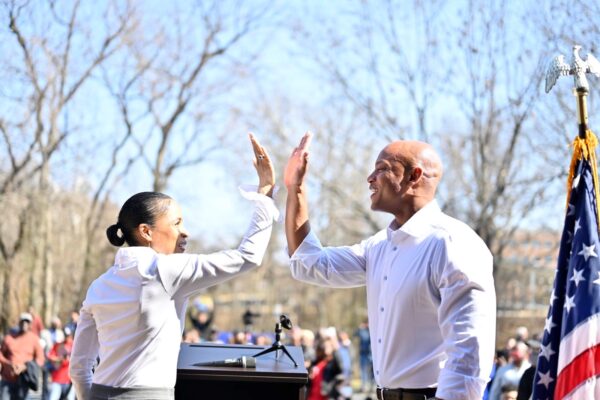
Prince George’s County Executive Angela Alsobrooks endorsed Democratic gubernatorial candidate Wes Moore at an event in Upper Marlboro in March. Campaign photo.
The Prince George’s County executive’s decision to endorse Moore was a pivotal moment in the trajectory of his political rise, crippling the candidacy of her predecessor and another gubernatorial contender, Rushern Baker, at the same time. Moore owes her big-time. Alsobrooks’ endorsement of Lierman was also important and well-timed, making it acceptable for Prince Georgians and for Black women to vote against Lierman’s Democratic primary opponent, Bowie Mayor Tim Adams. For good measure, Alsobrooks endorsed U.S. Rep. Anthony Brown, the winner in the Democratic primary for attorney general, stayed away from the bitterest internecine local fights in the primary, and, oh yeah, racked up 91% of the vote in her own re-election campaign. Many political professionals thought Alsobrooks would be a formidable candidate for governor if she had run — and she would have been. But now she can contemplate her future with even more political muscle and chits to collect.
Winner: Adrienne Jones
The Maryland House speaker went 3-for-3 in her statewide primary picks, and the timing of her endorsements of Moore and Lierman were especially critical. What’s more, Jones seems to have gotten all her preferred candidates through the crowded and complicated primaries in her home district in Baltimore County, and she’s also seeing some of her least favorite House colleagues defeated in Senate primaries, like Del. Jay Jalisi (D-Baltimore County) and Del. Mary Ann Lisanti (D-Harford).
Winners: Diversity and change
The state’s slow march away from old white guy political leaders is moving considerably faster, especially with Moore’s victory and Franchot’s defeat. The Democrats will have their most diverse statewide ticket in history, with Moore as the nominee for governor, former Del. Aruna Miller (D-Montgomery) as the nominee for lieutenant governor, Brown for AG and Lierman for comptroller. No matter who wins the general election, two-thirds of the Board of Public Works will be new — and state Treasurer Dereck Davis (D), who just started in January, will be the senior member. This after almost 20 years of former state Treasurer Nancy Kopp (D) on the BPW, 16 years of Franchot, and eight years of Hogan.
Winners: The Iveys
Not only is Glenn Ivey leading the Democratic primary in the 4th congressional district by a much larger margin (17 points) than anyone could have imagined — and seems certain to achieve his lifelong dream of serving in Congress — but his wife, Prince George’s County Councilmember Jolene Ivey (D), and son, Del. Julian Ivey (D-Prince George’s), were unopposed in their primaries. We’re not crazy about AIPAC or the attack campaign they ran against Glenn Ivey’s principal Democratic primary opponent, former Rep. Donna Edwards, but they effectively exposed some of her vulnerabilities, and Ivey took advantage.
Winner: Jill Kamenetz
There may not have been a more consequential or dramatic moment in the Democratic primary for governor than Kamenetz’s 36-second Facebook takedown of Franchot on June 17. Her husband, the late Baltimore County Executive Kevin Kamenetz (D), loved the political game, and he would have enjoyed it.
Winner: Don Mohler
Plenty of establishment figures wound up endorsing Moore for governor, but Mohler — who succeeded Kevin Kamenetz as interim county executive after serving as his top aide — gave Moore early insider cred and really paved the way for him to thrive in Baltimore County, which seemed an impenetrable fortress for Franchot when the primary began.
Winners: Republican women
The conventional wisdom is that it was a tough primary for the GOP overall, likely putting the gubernatorial race and the race for attorney general out of reach for Republicans with their far-right nominees. But there were some bright spots for the GOP — particularly the success of women in key primary races. Jaymi Sterling, Hogan’s daughter, trounced veteran incumbent Rick Fritz in the Republican primary for St. Mary’s County state’s attorney. Anne Arundel Councilmember Jessica Haire appears to have prevailed in the GOP primary for county executive; she’ll be in a tossup race in the general election with the Democratic incumbent, Steuart Pittman. Both Sterling and Haire are rising stars in the party.
In legislative district 7A, Del. Kathy Szeliga (R) ran up the score in her four-way primary for two seats, and got her preferred candidate through as well, muscling aside veteran Del. Joe Boteler (R). In the adjacent District 7B, Del. Lauren Arikan (R) handily defeated veteran Del. Rick Impallaria (R). Both Szeliga and Arikan are effective messengers for GOP conservatives — and both could also wind up running for higher office down the line.
And two congressional challengers bear some watching. Nicolee Ambrose in the 2nd District and Yuripzy Morgan in the 3rd District are undeniable underdogs this fall, but if they keep the races against well-established Democratic incumbents close, they could each be viable for other political offices down the line. The future for the state GOP is (mostly) female.
Winners: Women running for Montgomery County Council
For the past four years, Montgomery County, Maryland’s largest and most polyglot jurisdiction, has had just one woman serving on the county council. Pathetic. But in the Democratic primary, which is tantamount to election in MoCo, six women appear to have prevailed in the races for 11 seats: Marilyn Balcombe, Natali Fani-Gonzalez, Dawn Luedtke, Kristin Mink, Laurie-Anne Sayles, and Kate Stewart. So we’ll have an interesting dynamic in Rockville: The five returning councilmembers are all men; the six newbies are all women. The newcomers range from pro-business moderates (Balcombe) to full-throated progressives (Mink) to everything in between. But finally, a political bench in Montgomery that includes more women who can legitimately be mentioned for higher office. The future for county government is (mostly) female.
Winners: The Luedtkes
Meet the newest Maryland power couple: Del. Eric Luedtke (D-Montgomery) is the House majority leader in Annapolis. His wife, Dawn Luedtke, is one of the six women likely to join the Montgomery County Council at the end of the year.
Winner: Sophia Silbergeld
The well-respected Baltimore-based political strategist came into her own, running the table as the general fundraising consultant for Moore, Lierman and Brown.
Winner: Maryland State Education Association
The teachers’ union overcame some disagreements within its own ranks and wound up diverging from most of organized labor, endorsing Moore for governor instead of Tom Perez. The teachers also went with the winners, Brown and Lierman, in the AG and comptroller primaries. MSEA is always a powerhouse in Annapolis, but it will reap the benefits of having an ally in the governor’s office for the first time in eight years, assuming Moore wins. No one will be calling them thugs for a while.
Winner: Bill Ferguson
The Senate president also wound up in the Moore camp, though considerably later than Jones, but that’s not a bad thing. On top of that, he made important endorsements of Ivan Bates in the Baltimore City state’s attorney race and Sam Cogen in the sheriff’s race; Bates has been declared the primary winner, and Cogen is close to wrapping it up. Ferguson’s Team 46 performed well in his home district, where Del. Robbyn Lewis (D) was once thought to be vulnerable. And at Ferguson’s direction, the Senate Democratic Campaign Committee went all-in for winner Mary-Dulany James in the District 34 Senate primary and boosted vulnerable incumbent Sens. Ron Watson (D-Prince George’s) and Jeff Waldstreicher (D-Montgomery) as well.
Loser: Thiru Vignarajah
It’s probably three strikes and you’re out of politics for this ambitious and polarizing attorney, after losing three Democratic primaries in four years.
Losers: The Mosbys
Marilyn Mosby’s sui generis eight-year reign as Baltimore City state’s attorney is coming to an end, and much as she might see sinister forces behind her Democratic primary defeat it’s hard to get re-elected as the top prosecutor anywhere when you are under federal indictment. Surely her last place finish in the three-way primary will prompt some ambitious Baltimore politicians to look into challenging her husband, City Council President Nick Mosby (D) in the Democratic primary two years from now. He’s under an ethical cloud, too.
Winner: Cheryl Kagan
The Montgomery County senator offered an easy way out of this post-primary confusion, with a bill that would have enabled elections officials to open and count mail-in ballots early, but Hogan inexplicably vetoed it. Then she sounded the alarm that it would be a while before we learned anything definitive about the election, a well-appreciated public service. On the political front, she also had a pretty good day. She was one of the first elected officials to back Moore for governor, and she saw her rookie pick for House of Delegates in her district, Joe Vogel, win a slot easily in the Democratic primary after she muscled aside longtime incumbent Del. Jim Gilchrist (D). She was also a vocal supporter of some of the Montgomery County Council winners, but like the rest of us, she’ll have to wait to see whether her choice for county executive, businessman David Blair, ultimately prevails.
Winner: David Lashar
The Libertarian nominee for governor is a smart, interesting and entrepreneurial guy who held key roles in the Hogan administration during the governor’s first term. Now, he may be the vehicle for Hogan allies who don’t want to support Dan Cox, along with independents and conservative Democrats who fear Wes Moore may be too liberal.
Push: Johnny Olszewski
The Baltimore County executive bet on Tom Perez late in the Democratic gubernatorial primary, turning his back on the local candidate, Moore, only to see his man fall short. Still, it may not have been a total loss for Olszewski. By endorsing Perez, he signaled his loyalty to current and former staffers who felt kinship to Perez. His endorsement did give Perez needed momentum at a critical time. The unions that were backing Perez surely took notice, which could be an asset for Olszewski in some future campaign. And Olszewski got at least one gift out of the primary: He’ll be facing bombastic former Del. Pat McDonough (R) in the general election, all but guaranteeing him a second term in Towson.
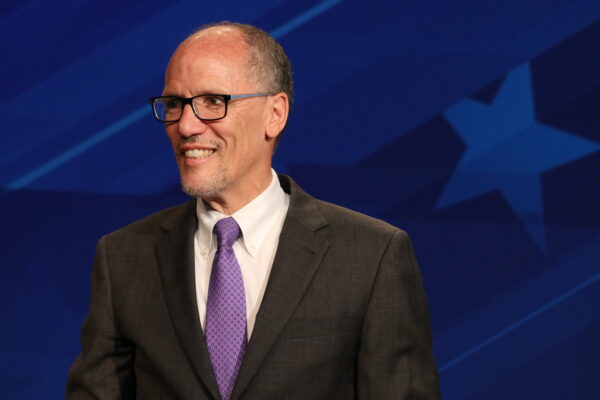
Former U.S. and Maryland Labor Secretary Tom Perez appeared at a Democratic gubernatorial debate hosted by Maryland Public Television in June. Photo by Danielle E. Gaines.
Push: Tom Perez
It took a while for the runner-up in the Democratic primary for governor to get his campaign firing on all cylinders. That was a mystery — and seems like a lost opportunity. Ultimately, he ran a pretty good campaign, and a guy who was well-admired when he started counts many more admirers today. It wasn’t enough to get him across the finish line, but we have no doubt he’ll be a good soldier for Moore during the fall campaign and we’re eager to see where he lands next.
Push: Organized labor
A lot of unions unsurprisingly invested very heavily in Perez’s campaign and didn’t get their candidate through. But the transition to backing Moore should be fairly seamless, and after eight years of Hogan, they can look forward to better days.
Loser: The Latino vote
It just didn’t materialize the way Perez needed it to. And a lackluster voter turnout appears to have doomed former state Sen. Victor Ramirez (D) in his bid for a Prince George’s County Council seat. Maryland’s Latino population is growing, but the influence of Latino voters on state politics is still lacking.
Push: Cory McCray
If a single legislator worked harder for a candidate for governor than the Baltimore senator did for Perez, we’re unaware of it. Sure, Perez lost, but that was no fault of McCray’s, and while that may put McCray out of Moore’s inner circle, he has enough friends in Moore’s inner circle, and is enough of a power player in the city, that he’ll remain important. More puzzling was his decision to go after Del. Stephanie Smith (D) in his own district. The fruits of those labors are still TBD: the results in the 45th District House primary are spine-tinglingly close.
Winner: Andy Harris
The lone Republican in Maryland’s congressional delegation was Trump-y before there was a Trump, and he’s always been a leader in the state GOP. With Hogan soon to exit the scene, Harris is poised to become even more powerful in internal Republican politics — and more of the rising stars in the party resemble Harris than Hogan. Harris may be in for some unwanted scrutiny now that it’s been reported that he participated in a strategy session at the Trump White House to discuss overturning the 2020 election results. And he faces his most aggressive challenger yet in former Del. Heather Mizeur (D). But though he’s the antithesis of warm and fuzzy, Harris has some built-in Teflon that serves him well.
Winner: Doug Thornell
Wes Moore built a talented campaign team around him, including the national Democratic media firm SKDK. With SKDK came Thornell, a Maryland resident who’s a partner at the firm and has worked for several politicians in the state. Thornell is more than just a media consultant — he’s a soup to nuts strategist who began guiding Moore when the candidate was early in his exploratory phase. This cycle, Thornell’s Maryland clients also include Glenn Ivey and health care executive David Blair, who, as of this writing, is narrowly leading in the Democratic primary for Montgomery County executive. This is the guy you want to talk to if you’re thinking of running for a high office in the Free State.

After a day of campaigning, Katie Curran O’Malley, Democratic candidate for Maryland Attorney General, chats with former U.S. Sen. Barbara A. Mikulski and Matthew D. Gallagher, president and CEO of the Goldseker Foundation, outside a polling place at First English Lutheran Church, Charles and 39th Streets in North Baltimore. Photo by William F. Zorzi.
Push: The O’Malley brand and the O’Malley machine
If you think of her as a novice political candidate — which she was — Katie Curran O’Malley did pretty well in her campaign for attorney general, even though she fell well short in the Democratic primary. The former Baltimore City judge impressed a lot of people with her qualifications, passion and smarts. But if you look at her as part of the O’Malley team, or as a scion of the Curran political family in Baltimore, then the result doesn’t look quite so good. And it’s pretty apparent that the O’Malley brand wasn’t especially an asset: O’Malley did slightly worse in Baltimore City, the family’s home base, than she did statewide. The AG campaign united a lot of the old Martin O’Malley team on her wife’s behalf. They did slightly better as members of Wes Moore’s kitchen cabinet.
Winner: Anthony Brown
Not only did he take another step in his political rehabilitation — not that serving in Congress has been a bad consolation prize — but he won the Democratic primary for attorney general by vanquishing his former boss’ wife, even though his own campaign wasn’t too impressive. And he got to watch Larry Hogan have a tough night.
Push: Marc Elrich
He may win a second term as Montgomery County executive (he may not). But did he even run a campaign? There was no real evidence of one — just a vague reliance on union-funded polling that showed him doing OK. Elrich actually had a story to tell voters, especially about his solid stewardship during the worst of the COVID-19 pandemic. Did it ever get communicated? The few times we heard about Elrich being in campaign mode, it was mostly over silly squabbles or intemperate comments during campaign forums. Elrich remains a one-of-a-kind politician — for better and worse.
Loser: Tom Hucker
The Montgomery County councilmember, an effective progressive lawmaker for a number of years, usually has very sound political instincts. But he seemed lost this time around: First, flirting with a run for state comptroller, then, giving up a fairly safe re-election race for his district seat, entering the Democratic primary for county executive making assumptions about hypothetical support that never really materialized, then jumping into the at-large council primary on the day of the filing deadline. Hucker’s career in advocacy and public service is far from over, but he’ll need some time to regroup.
Winner: Harris Jones Malone and Capitol Strategies
Most Annapolis lobbying firms stayed neutral in the gubernatorial election, but there were a few exceptions. Harris Jones Malone seemed to go all-in for Moore — especially partner Sean Malone — and Capitol Strategies hosted an early fundraiser for the candidate back when few people were paying attention. That surely gives these firms a small leg up with the new administration, assuming Moore wins.
Push: Bruce Bereano
Bereano was the only prominent member of the Annapolis lobbying corps to offer full-throated support to Larry Hogan in 2014, and it’s paid dividends. This time, he bet all his chips on Franchot. Bereano remains a singular presence in the state’s political firmament, and his decision to back a losing horse isn’t going to affect his ability to represent his huge stable of clients on a day-to-day basis. But it is a reminder that his political radar is sometimes off. And heck, both Hogan and Franchot are in office for six more months and represent two-thirds of the Board of Public Works — there may still be ways to reward him.
Losers: Registered lobbyists who became candidates
At least two lobbyists ran for office this year, and both appear to have finished out of the money: Maryland Retailers Association President Cailey Locklair finished third in a Republican primary for an open county council seat in Anne Arundel County, while Jocelyn Collins, government relations director for the American Cancer Society in Maryland, Delaware and Washington, D.C., was trailing for a Prince George’s County seat in the House of Delegates by just 115 votes in the Democratic primary on Monday.
Winner: Jazz Lewis
The Prince George’s County delegate and chair of the House Democratic Caucus in Annapolis saw the writing on the wall and wisely got out of the 4th District congressional primary, which he knew was going to get ugly and that he probably wouldn’t win. Instead, he honed his political organizing skills in his legislative district and backed Moore for governor, even as his senator, Joanne Benson (D), got behind Perez. At age 33, his future remains bright, either in Annapolis or for some other office.
Winner: Maggie McIntosh
Even as she moves toward retirement, the former House Appropriations Committee chair flexed her muscle in her home district in Baltimore City, lining up an array of political celebrities and genuine supporters for her preferred House candidates in the District 43A Democratic primary, Del. Regina Boyce and lawyer Elizabeth Embry.
Loser: Mary Washington
See above. Washington, the District 43 senator, could not read the tea leaves and found herself on the losing end of the District 43A House primary. She backed Logan Endow, a good and qualified candidate, but she did not have the political organization to get him through against Boyce and Embry. Washington, Boyce and Embry are all grown-ups, committed to serving the district, so outwardly they will do fine working together. But Washington may have invited a Democratic primary challenge in 2026.
Winner: Ernest Davis
The Wicomico County Councilmember is now the Democratic nominee for county executive, and though he isn’t the world’s most dynamic politician, and the county leans Republican, he improbably has a chance to win in November now that Republicans have appear to have nominated Trump acolyte Julie Giordano over incumbent County Executive John Pstoa. Business interests and civic groups are quietly starting to line up behind Davis — and it begs the question of whether other ambitious Democrats, like Salisbury Mayor Jake Day and Wicomico Councilmember Josh Hastings, erred by not seeking the job.
Loser: Michael Hough
Hough, a Republican state senator, had planned to run for Frederick County executive as a suburban dad and common sense center-right candidate, but Cox’s victory in the GOP primary for governor makes his task more difficult. The two share a legislative district and Hough, like other Republican candidates in competitive races, will be asked to account for some of the gubernatorial nominee’s more outrageous statements — and Democrats are sure to plumb his record in Annapolis for problematic votes. What’s more, Republicans saw the Democrat they thought they could beat more easily, County Councilmember Kai Hagen, lose in his primary.
Winner: Jessica Fitzwater
See above. The Frederick County councilmember, who won the Democratic nomination for county executive, benefits from the political terrain in the gubernatorial race. Her race has probably gone from tossup to tilt Democrat.
Loser: Allan Kittleman
See above. The Republican former Howard County executive saw his chances of getting his old job back diminished by the presence of Cox and Peroutka as statewide GOP nominees. And he knows it.
Winner: Calvin Ball
See above. The Democratic Howard County executive went from being a slight favorite in his rematch with Kittleman to a heavier favorite.
Loser: Barry Glassman
See above. The Harford County executive is one of the nicest guys in Maryland politics, with a string of accomplishments and he represents the Republican Party’s strongest nominee for state comptroller in over a century. But he too is squeezed (and probably doomed) by Cox and Peroutka.
Loser: Al Carr
His decision to give up a safe House seat after three terms to run for Montgomery County Council was one thing, but the way he did it, waiting until the very last minute to switch races, leaving a vacancy in the Democratic House primary that party leaders had to scramble to fill, was puzzling and created a mess. And it was out of character for a policymaker who has made transparency and political reform a hallmark of his career. Did it impact his run in a new council district with funky boundaries? Hard to say. But the late start and last-minute decision sure didn’t help matters.
Winner: Kathleen Kennedy Townsend
Well, she may not have run the worst race for governor in recent memory anymore.
This article was written by Maryland Matters, read more articles like this here.
Photo: A sunny day at the State House. Photo by Danielle E. Gaines.


